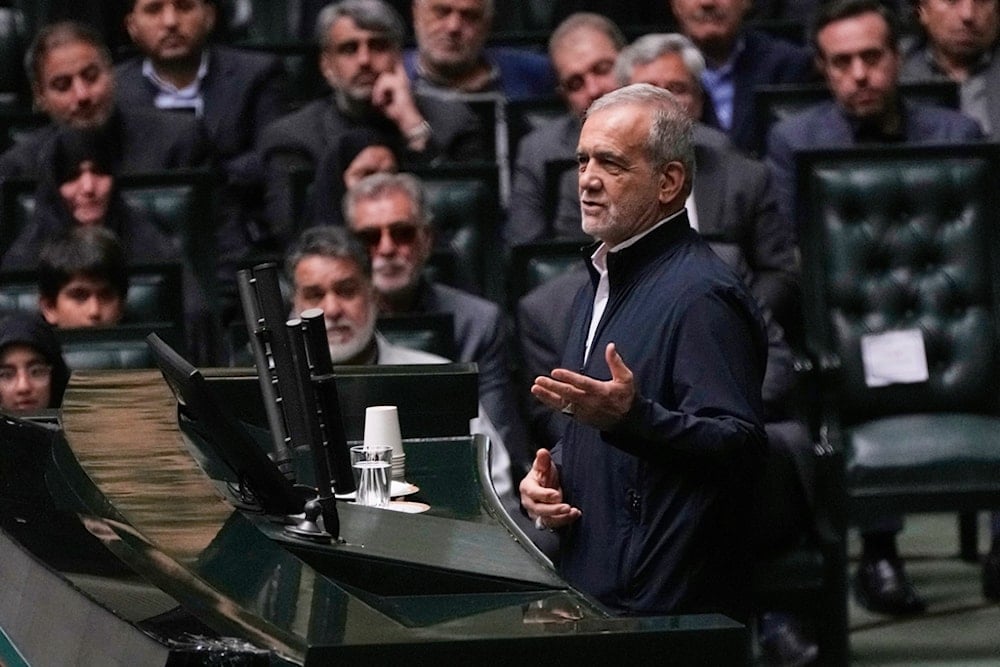Iran Guardian Council approves suspension of cooperation with IAEA
Iran halts cooperation with the IAEA after Israeli-US attacks on its nuclear facilities, as the parliament demands safety guarantees
-

Iranian President Masoud Pezeshkian speaks during a memorial at the parliament in Tehran, Iran, Wednesday, May 21, 2025 (AP)
Iran’s Guardian Council has ratified a parliamentary resolution mandating the suspension of cooperation with the International Atomic Energy Agency (IAEA), according to Council spokesperson Hadi Tahan Nazif.
The Iranian Parliament approved the resolution on Wednesday in light of Tehran’s increasing frustration over the IAEA’s failure to condemn recent attacks on its nuclear facilities. The decision does not signal Iran’s withdrawal from the Nuclear Non-Proliferation Treaty (NPT), according to Al Mayadeen’s correspondent.
Parliament Speaker Mohammad Bagher Ghalibaf stated during the session that the Iranian Atomic Energy Organization would suspend cooperation with the IAEA until the safety of Iran’s nuclear facilities is guaranteed. He criticized the agency for failing to issue even a symbolic condemnation of the attacks and emphasized that Iran would accelerate its peaceful nuclear activities while remaining highly cautious of international promises.
Alireza Salimi, a member of the Shura Council's presidential committee, clarified that under the new resolution, IAEA inspectors will be denied entry into Iran unless the security of Iran’s nuclear infrastructure and peaceful nuclear operations is assured.
Inspector access 'remains a top priority'
In response, IAEA Director General Rafael Grossi emphasized on Wednesday that the agency's top priority was to regain access for inspectors to Iranian nuclear sites.
Speaking at a press conference during an Austrian National Security Council meeting in Vienna, Grossi said that inspectors must return to assess the impact of recent US and Israeli military strikes on Iranian nuclear facilities and verify the status of enriched uranium stockpiles.
Grossi added that the agency was particularly concerned with the three main facilities where uranium enrichment was taking place before the Israeli assault began.
When asked whether Iran had updated the agency on its enriched uranium reserves, particularly those enriched up to 60%, Grossi referred to a letter received from Tehran on June 13, the day the military campaign began. The letter indicated Iran's intention to take "special measures" to safeguard its nuclear materials and equipment.
Tehran halts IAEA access
Iran’s Parliament announced a major shift in nuclear oversight policy on Wednesday, voting to suspend cooperation with the International Atomic Energy Agency (IAEA) unless the safety of its nuclear facilities is guaranteed. The move comes in the wake of recent Israeli-US aggression targeting key nuclear sites, which Iranian lawmakers say the IAEA failed to condemn.
Speaking during a parliamentary session, Iranian Parliament Speaker Mohammad Bagher Ghalibaf declared that Tehran would no longer cooperate with the IAEA until its nuclear facilities are fully secured. He criticized the international watchdog for remaining silent in the face of attacks on Iran’s sovereign infrastructure.
“The IAEA did not issue even a symbolic condemnation,” Ghalibaf stated, criticizing the agency’s silence in the face of blatant attacks. He warned that Iran’s peaceful nuclear program will now accelerate “at a faster pace,” with heightened vigilance against diplomatic manipulation. The top Iranian lawmaker emphasized that Tehran is more prepared than ever and will meet any future aggression with “crushing force.”
Parliament passes resolution to restrict inspections
In a parallel announcement, Iranian Member of Parliament Alireza Salimi revealed that lawmakers had passed a resolution to suspend all forms of cooperation with the IAEA. The legislation prohibits IAEA inspectors from entering Iranian territory unless assurances are given regarding the safety of Iran’s nuclear activities.
The resolution includes punitive measures for any individuals or entities that permit access to IAEA personnel. It also extends beyond site inspections to cover broader safeguard agreements and cooperation protocols with the agency.

 4 Min Read
4 Min Read








